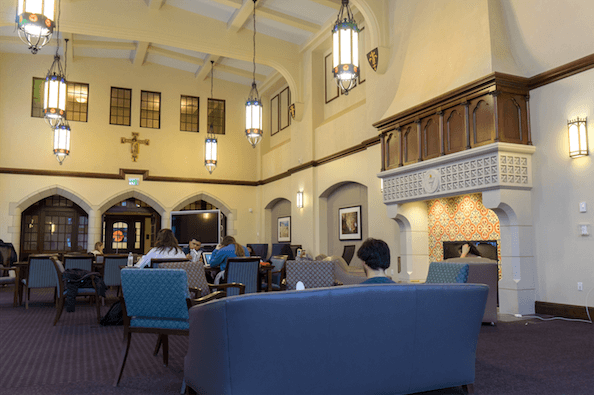by The Cowl Editor on April 12, 2018
Campus

by Nicholas Moran ’19
Opinion Staff
Reading on a leather chair in front of a crackling fire, no study-spot on campus trumps the Fiondella Great Room. Far from the crowded echo-chamber that is Phillip’s Memorial Library, the Great Room is dead silent and comfortably furnished. One time, when the library closed, security office let students stay until the early morning hours.
Unfortunately, school events in rooms like the Great Room force studiers out of their favorite campus spot, with few alternatives. Now, I waste precious time wandering through the library’s back halls, trying to find one last open desk. Echoes blare over the library bookshelves, distracting studiers in the “Quiet Zone” with sounds of chatting, cell phone ring-tones, and unmentionable ongoings in the bathroom. Paying attention in the chaos of college dorms is near impossible, as is trying to drown out the never-ending John Hughes soundtrack blaring from Slavin’s speakers.
Trapped in a rickety desk in the library’s back halls, students need more alternative study spaces. Far from the “shared usage” space that administration claims, rooms like the Great Room have devolved into pure event halls, with only sporadic time for students. Of course, as professors host visitors to our campus, groups need spacious and presentable spaces to hold events, but it should not be at the expense of displaced students. When faced with a space crunch, Providence College should provide alternative study spots for its students.
Representatives from the Office of College Events, 25 Live Central Reservations, and Student Activities have noticed a rise in requests for event space in recent years. With more events competing for the same amount of space, the administration claims to have taken steps to preserve study time for students in event areas. However, it has become clear that these measures are hollow, unenforceable, and simply rhetoric.
For instance, the administration claims to reserve the Great Room for academic events and year-ending club events, forcing clubs and student organizations to use other rooms for weekly meetings. Yet this has done nothing to free time for studiers.
Daily, the room is filled with events that force out studiers, regardless of the fact that they are “academic events” rather than club meetings. In fact, administration admits that small club events occasionally commandeer the space without formal approval, further muddying the reservation issue.
Similarly, administration claims to reserve study time in the Great Room and Moore lounges, yet these reservations’ terms render them toothless. According to the administration, it would be “too strong” to say that these reservations “forbid” events during these study times, rather, they “encourage” events to respect study hours. Yet if events are not forbidden during study hours, how can administration claim to set aside time for studiers in these “shared usage spaces?” Should studiers plug their ears in the Great Room’s corner, trying to drown out a lecturer’s talk on Stoic philosophy?
Fortunately, Student Congress members Ben Harper ’18 and Lexi Lima ’20 introduced “A Recommendation Regarding Study Space Reform” last December. This measure “recommended” that the Ruane and Aquinas Lounge, and the Great Room “cannot be reserved” for events after 8 p.m. from Sunday to Thursday. As admirable as the recommendation is, it remains just a recommendation, totally unenforceable. In fact, administration made it clear that this measure has not completed the “process for those recommendations to be considered and adopted campus wide.”
Additionally, the administration requires event holders to request their spaces to be cleaned and cleared immediately, allowing studiers and even classes to enjoy them afterward. All too often, these spaces are not cleaned properly after events, as rows of chairs, projectors, and aging food sometimes fill the Great Room. Overfilled with waste and plastic chairs, how are students supposed to use these “shared usage” spaces? Of course, students may enjoy the cheese platter that a speaking event forgot, but left overnight, ants also enjoy the provolone!
Furthermore, just as studiers struggle to find a comfortable spot, event planners also are faced with few options. As professor Dr. Colin Jaundrill of the history department noted, “there are only so many rooms on campus that can both accommodate a large audience and allow PC to put its best foot forward” with events. Spacious lecture halls and “other similarly-size spaces” fill up quickly, leaving the “welcoming” Great Room as one of the few options that “demonstrates a modicum of respect for our guests.”
Similarly, history professor Dr. Jennifer Illuzzi stated that the room was “not easy to get,” as event planners clamor to reserve “the nice… [Great Room] in the ‘signature’ building for the humanities.” In fact, with “quiet studiers” dominating the room in the morning and events at night, Illuzzi noted that the ‘round the clock use prevents people from using the space as “a collaborative… group space,” where professors can meet with students.
Faced with weeklong waitlists and an overflowed library, the College needs to provide more study spaces. As interesting speakers and enlightening events come to campus, studiers cannot be forgotten in the fray. No longer should students have to resort to a messy dorm room desk, or search the back halls of the library for one more desk. PC, place study hour limits with teeth, ensure that studiers can actually share these “shared usage” spots, and expand studying hours; your students’ GPAs will thank you.